Did it ever cross your mind what exactly you’re getting in a can of Red Bull? And how nutritionally viable is it for you to have one?
A standard 8.4 fl. oz can of Red Bull contains 110 calories, 27 g of sugar, and 80 mg of caffeine along with a handful of sodium, 1000 mg of taurine, and several B-Vitamins.
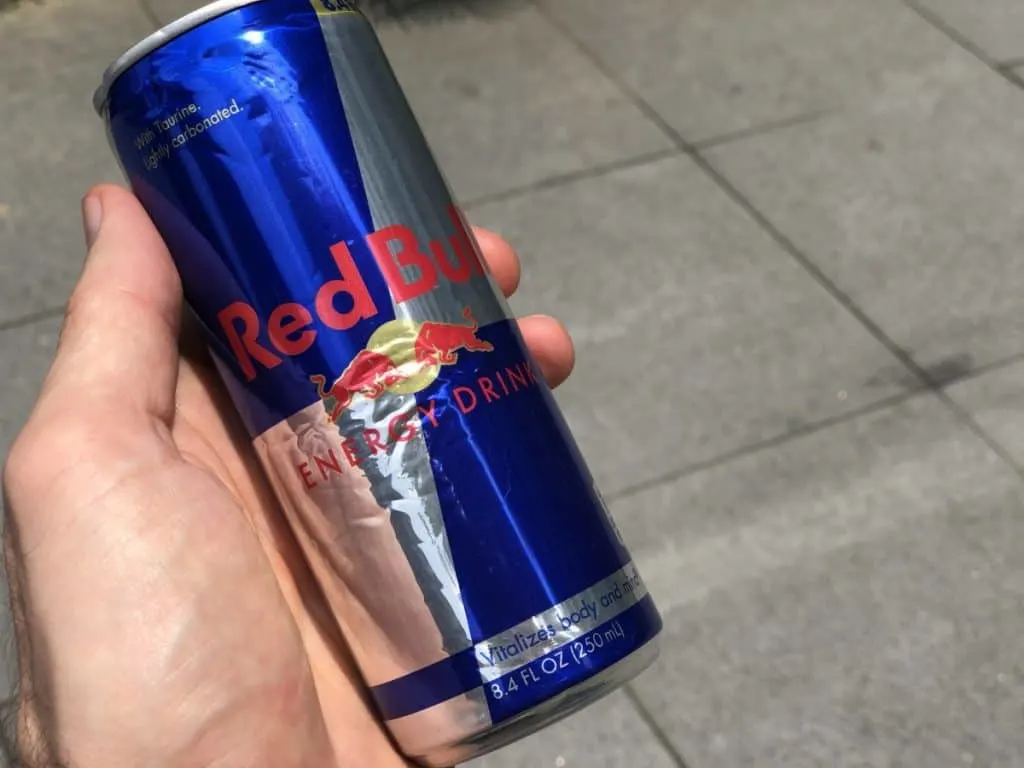
That’s quite a lot for one can, I must say! However, I can assure you that the amount of ingredients in Red Bull is enough to keep you energized for a couple of hours.
For an in-depth analysis of the nutrient facts of Red Bull energy drink and how it affects you nutritionally, Let’s get started with the nutrition label.
Page Contents
Is Red Bull full of sugar?
Red Bull is not full of sugar. The can of Red Bull also has a variety of other beneficial components. Red Bull is a beverage that is sweetened because a serving size of 260 milliliters contains 29 grams of sugar.
Is it healthy to drink Red Bull?
It is healthy to drink Red Bull. This is should come from the fact that Red Bull is not consumed on a regular basis or in quantities that are considered to be unhealthy. Responsible consumption of Red Bull is the key to making it a healthy beverage.
Red Bull Nutrition Label
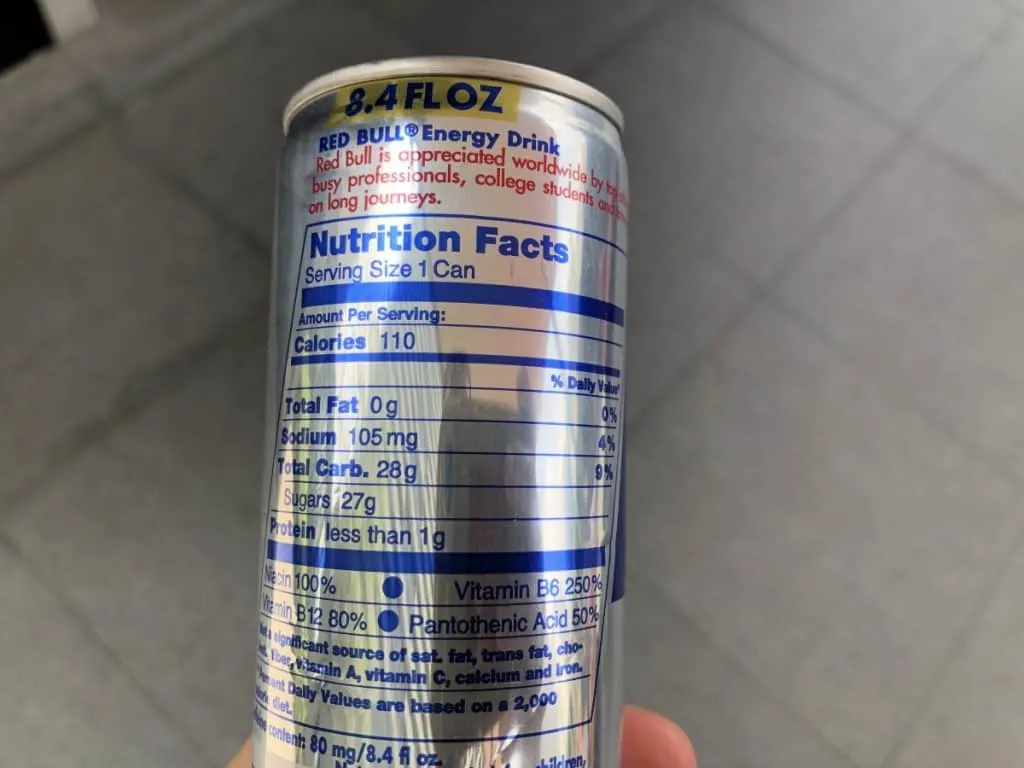
To get a rough idea of what’s in Red Bull energy drink, let’s take a look at the nutrition label found on the back of the can.
| Daily Values | The amount present in a standard can of Red Bull (8.4 fl oz) |
| Energy | 110 calories |
| Fat (Of which Saturated) | 0 g (0 g) |
| Carbohydrate (Of which Added Sugars) | 28 g (27 g) |
| Caffeine | 80 mg |
| Sodium | 105 mg |
| Vitamin B3 (Niacin) | 22 mg |
| Vitamin B5 (Pantothenic Acid) | 5.1 µg |
| Vitamin B6 | 5.1 µg |
| Vitamin B12 | 5.1 µg |
For better explanation, check out this video!
The Ingredients
I think Red Bull’s ingredients are not that strong compared to most energy drinks, but together they work really well. Here’s a quick list of the main active ingredients that are present in Red Bull.
- Caffeine
- Carbonated Water
- Sucrose
- Glucose
- Citric Acid
- Taurine
- Sodium Bicarbonate
- Magnesium Carbonate
- Niacinamide
- Calcium Pantothenate
- Pyridoxine HCl
- Vitamin B12
- Natural and Artificial tones & Flavors
If you want to know in depth details of Red Bull ingredients, check this article that I have written.
Calories in Red Bull
A standard 8.4 fl oz can of Red Bull has a total of 110 calories, which is a fairly moderate amount for an energy drink to have.
However, if you’re looking for an energy drink with a lower calorie count, Red Bull probably isn’t going to fit into that particular niche.
Given the fact that an average adult usually needs around 2000 to 2500 calories per day (vary by individuals), a can of Red Bull shouldn’t affect your health as much.
With that being said, having more than one can a day start piling up the number of calories pretty quickly. So, make sure not to overconsume.
Even though Red Bull might give you some workable calories, it’s always better to have a healthy meal instead.
Overall, my suggestion would be to keep your intake within a reasonable level so that you don’t end up gaining those extra calories with your Red Bull Energy Drink consumption.
Caffeine Content in Red Bull
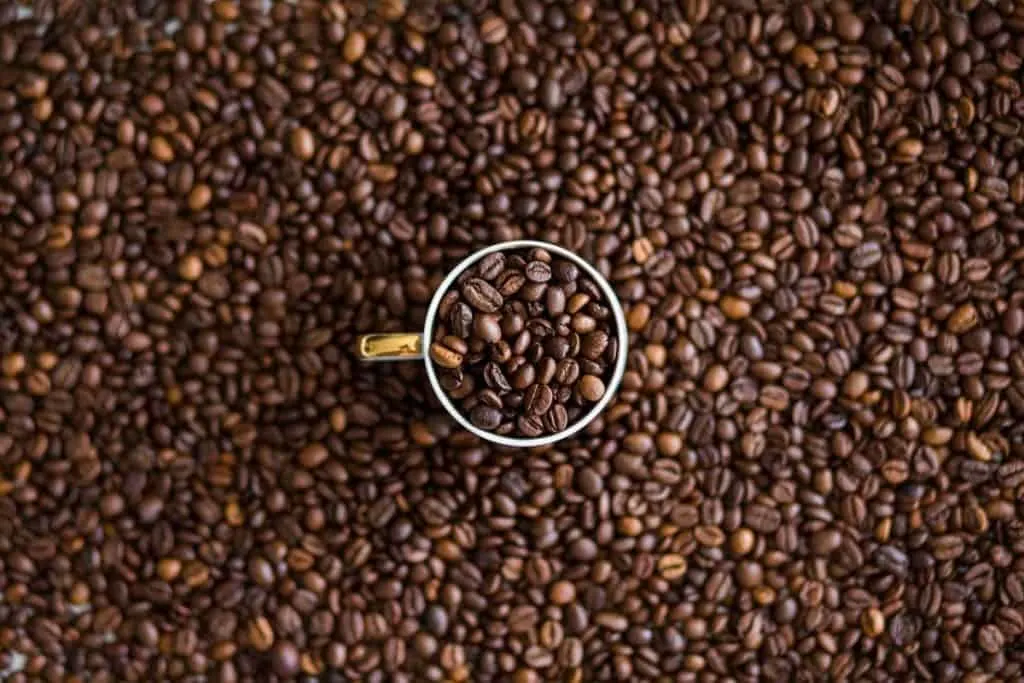
A standard 8.4 fl. oz can of Red Bull has 80 mg of caffeine which is not much. In fact, it’s the same amount of caffeine that you get in a cup of coffee.
Personally, I prefer my energy drinks to have somewhere between 50mg to 100mg of caffeine per day, which I find to be just the right amount to provide me a quick boost and also because I don’t feel overwhelmed afterward.
But, of course, it totally depends on your own caffeine tolerance. If you have a relatively high caffeine tolerance, you might need a couple of cans a day before you really start to feel the caffeine kick.
But make sure not to have more than one can at once in order to prevent potential side effects and physical discomfort.
The potential side effects of caffeine include:
- insomnia
- restlessness
- headache
- stomachache
- dizziness
- dehydration
- anxiety
It’s best to keep your caffeine consumption within the recommended level which is 400 mg of caffeine per day to avoid all of these symptoms.
Added Sugars in Red Bull
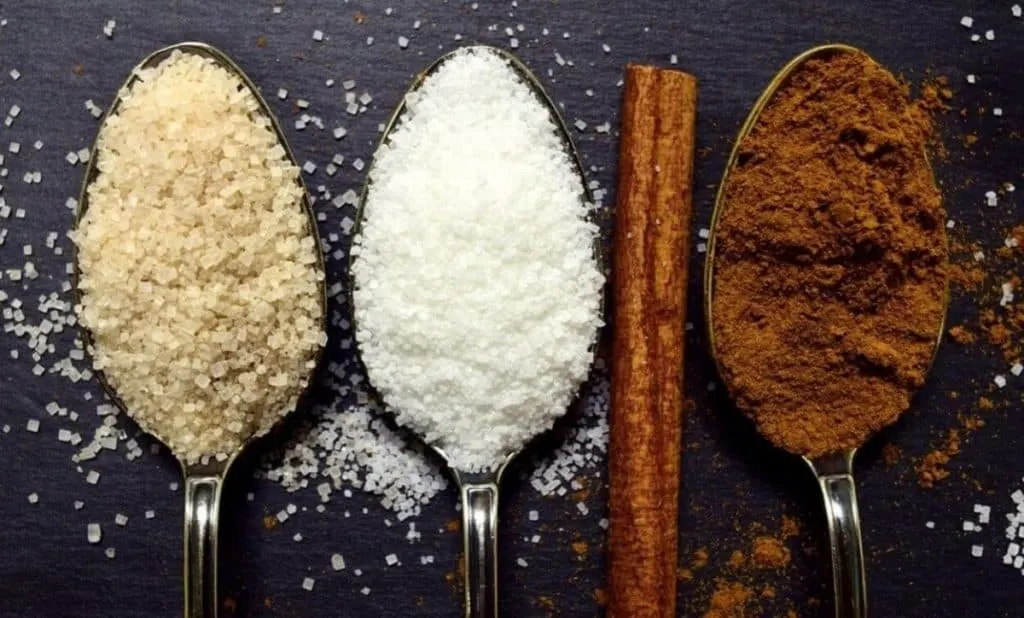
A standard can of Red Bull contains 27 grams of sugar, which is relatively low compared to the sugar content of other energy drinks.
However, it is still a massive amount, especially if you compare it with the recommended level of daily sugar intake which is 36 g and 25 g for men and women respectively.
As you can see, for women, the sugar content in Red Bull already crosses the daily recommended limit while men are very close. Considering that it’s not the only sugar in your daily diet, you should be mindful of your regular Red Bull consumption.
Although Red Bull does have sugar-free options like Red Bull Total Zero & Red Bull Sugar-free that contain Aspartame, Acesulfame K, and Sucralose instead of regular sugar. I still think it’s not very healthy because of the potential side effects.
Having sugar in a small amount is totally fine because sugar also works as a mood booster. But having too much sugar for a long period of time can lead to some serious health issues like metabolic syndrome.
The other notable side effects includes:
- weight gain
- type II diabetes
- increased risk of heart disease
- acne
- depression
Furthermore, too much sugar can lead to a spike in your blood sugar followed by a crash, which is something we definitely don’t want.
So, it’s always better to keep your Red Bull consumption to a healthy level. This way you’ll be able to stay safer and fully enjoy your favorite Red Bull energy drink.
Taurine in Red Bull
Taurine is a natural amino acid that has many health benefits, which is why it is a widely used ingredient in energy drinks like Red Bull.
The taurine content in Red Bull is fully synthetic, so you don’t have to worry about it being derived from animals or the rumors of it being extracted from bull semen, which is utterly false.
The benefits of taurine include:
- promotes healthy metabolism
- protects the muscles
- improves exercise performance
B-Vitamins in Red Bull
The B-Vitamins found in a can of Red Bull are niacin, pantothenic acid, B6, and B12.
From converting energy to forming cells, B-Vitamins play a very vital role in the human body. And a great thing about Red Bull is that it has loads of B-Vitamins per serving.
Let’s take a closer look at the table below for more details on the B-Vitamin content of Red Bull.
| Components | Purpose | Amount (in a 8.4 fl oz can of Red Bull) |
| Vitamin B3 (Niacin) | helps in the formation of energy | 5.1 µg (100% of recommended daily intake, RDI) |
| Vitamin B5 (Pantothenic Acid) | improves mood & boosts metabolism | 5.1 µg (50% of RDI) |
| Vitamin B6 | turns food into energy, helps create neurotransmitters, such as serotonin and dopamine | 5 mg (250% of RDI) |
| Vitamin B12 | produces energy by metabolizing fat and proteins | 5.1 µg (80% of RDI) |
Red Bull Energy Drink Benefits
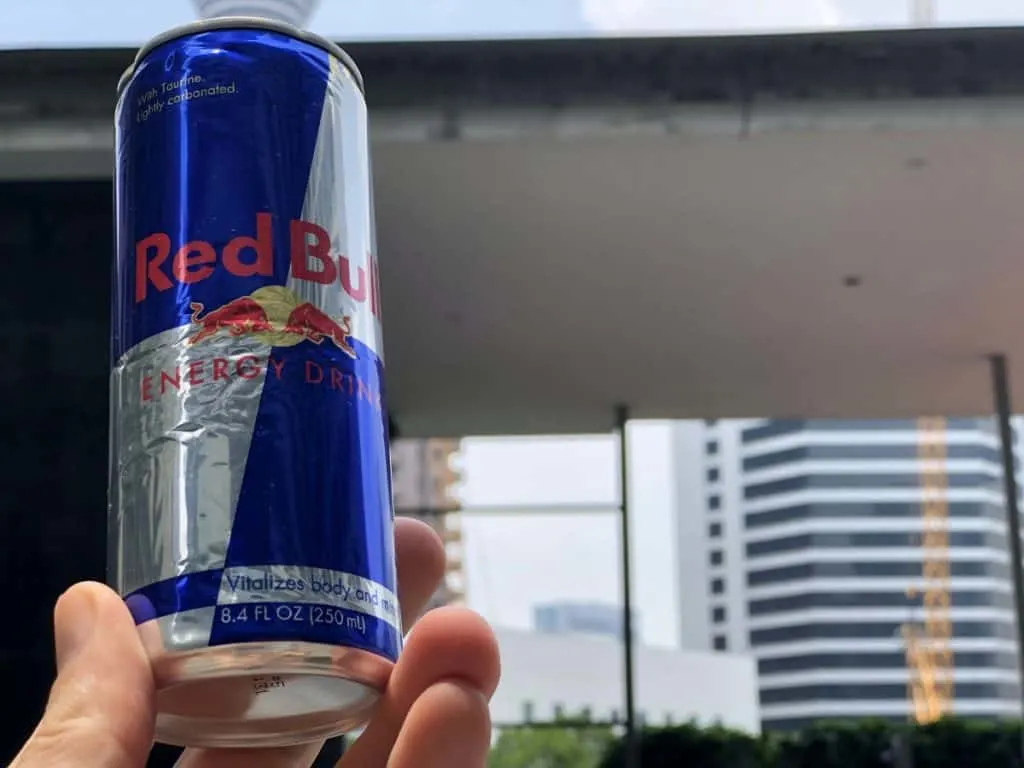
Other than giving you an instant energy boost, Red Bull has a positive effect on cognitive performance as well as improving reaction times.
Whether you’re struggling with concentration or preparing for an intense gaming session or driving late at night, Red Bull has the ability to keep you fairly awake and energized.
Although the sugar in Red Bull isn’t too great for your health, Red Bull does get the job done by keeping you awake and giving you a quick energy boost to push through whatever you’re aiming for.
Just make sure you don’t overdose yourself with too many cans of Red Bull at once and you’re good to go!
Does Red Bull contain Alcohol?
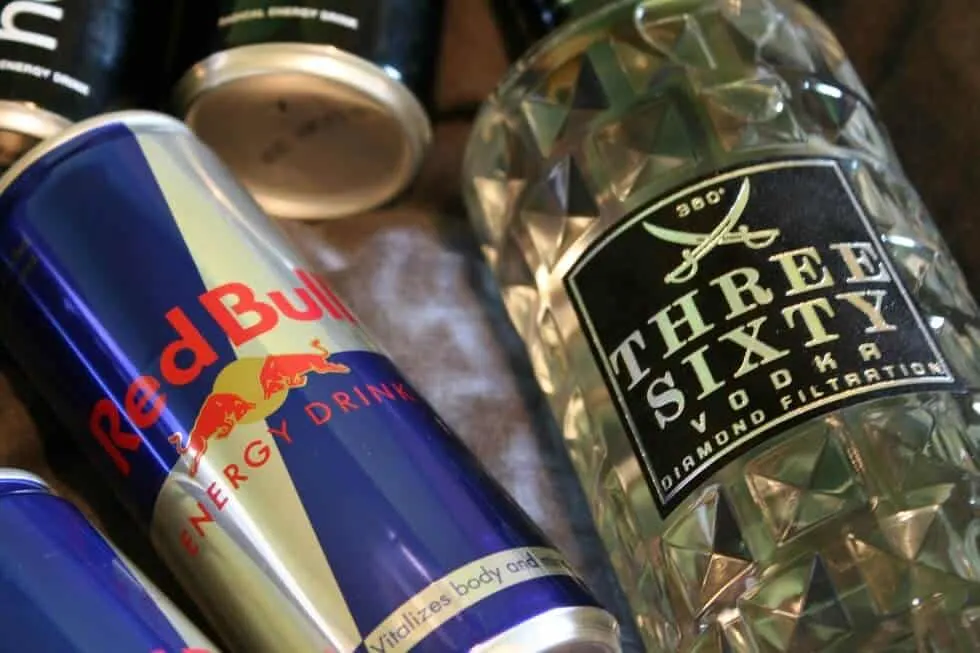
Although some choose to drink it with alcohol but Red Bull by itself is definitely a non-alcoholic drink.
If you see the nutritional label of Red Bull, you’ll see that it doesn’t contain any alcohol or anything specific that brings an alcoholic effect to it.
That being said, you must not mix alcohol with Red Bull or any other energy drink. Mixing these two tricks your body into drinking more alcohol than you can manage, leading to serious issues like alcohol poisoning.
Is Coffee better than Red Bull?

Altogether, all I can say is that it’s not really a matter of which one is better, but more of which one you prefer.
Coffee and Red Bull, both are caffeinated drinks that have a pretty similar amount of caffeine per serving ( a standard can of Red Bull has 80 mg of caffeine which is equivalent to a cup of coffee).
A lot of factors go into determining whether or not coffee is better than energy drinks like Red Bull. These include caffeine content, sugar content, health effects, etc. So it’s kind of hard to come up with a single answer.
Coffee is full of antioxidants and is almost calorie-free (unless you choose to add extra sugar or cream in it, which will raise the calorie count).
Whereas Red Bull has a total of 110 calories per serving, which is not a lot but considering that it’s not the only thing you’ll be having in a day, the calories in Red Bull can harm your health.
However, Red Bull has a bunch of important B-vitamins that coffee lacks. In that sense, coffee is not doing any better.
I personally would include a cup of coffee in my daily diet and would only go for a can of Red Bull occasionally. Because coffee will contribute to less energy drain compared to energy drinks like Red Bull.
Again, it completely depends on you. If you think Red Bull is doing you good, you can totally have it. But I highly recommend you monitor your regular intake of caffeine with either of these drinks.
Is Red Bull Bad For Your Health?
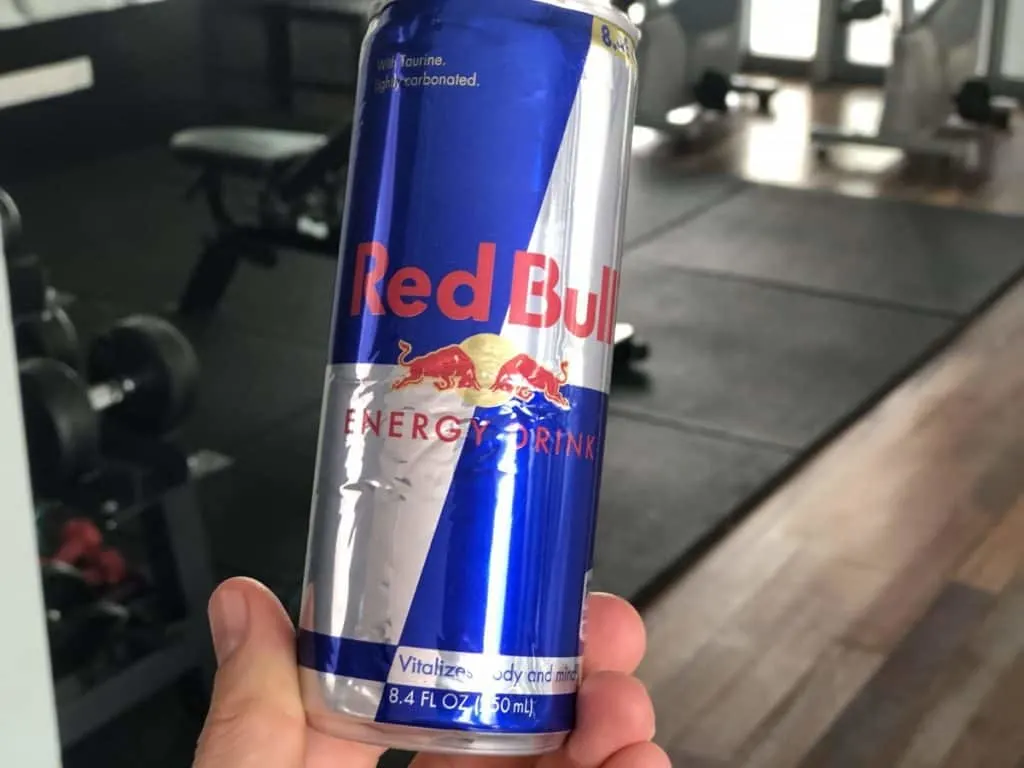
As long as you’re healthy and you drink in moderation, a can of Red Bull now and then shouldn’t be a problem for your health.
Given the fact that Red Bull has relatively low calories and caffeine compared to the other energy drinks in the market, it is certainly not the unhealthiest energy drink that you could be having.
But that doesn’t mean you’ll overdose yourself with too many Red Bull at once, that’s totally not healthy for anyone no matter what your caffeine tolerance level is.
Make sure you’re fully aware of the potential side effects before grabbing your next can. You should be having a can of Red Bull only when you really need it.
Therefore, Red Bull is completely safe for you as long as you maintain a healthy lifestyle with a balanced diet and limit your daily intake of caffeine and sugar to the recommended level.
Is Red Bull good for health?
Red Bull can be good for your health. However, Red Bull, like other energy drinks, contains high levels of caffeine and sugar, which can have negative health effects when consumed excessively or on a regular basis. Excessive caffeine intake can lead to increased heart rate, elevated blood pressure, restlessness, and disrupted sleep patterns.
While Red Bull can provide a temporary energy boost and increased alertness, it’s important to consider the potential risks and exercise moderation when consuming it. It’s generally advisable to prioritize a balanced diet, regular exercise, sufficient sleep, and hydration with water for overall health and energy levels.
Is Red Bull bad for the liver?
There is limited scientific evidence suggesting that excessive consumption of energy drinks like Red Bull may have a negative impact on liver health. The high sugar content in Red Bull, when consumed in excess, can contribute to weight gain and obesity, which are risk factors for non-alcoholic fatty liver disease (NAFLD).
It’s important to note that moderate consumption of Red Bull or other energy drinks is generally considered safe for individuals with a healthy liver. However, those with pre-existing liver conditions or at a higher risk of liver disease may need to exercise caution and consult with a healthcare professional.
Red Bull Flavors
Although Red Bull is most popular for its classic Original flavor, they do have many different variants for you to try out. Here’s a list of the currently available flavors in the market:
- Sugar-free
- Total Zero
- Simply cola (cola)
- Limon (Lime)
- Red (watermelon)
- Yellow/Tropical (tropical fruit/mango-papaya)
- Green/Kiwi (kiwi-apple)
- Ruby/Red (grapefruit)
- Purple/Acai Sugar-Free (açai)
- White/Coconut (coconut berry)
- Peach (peach-nectarine)
- Purple/Acai (açai berry)
- Total Zero (no calories)
- Yellow/Tropical Sugar-free (tropical)
- Green/Refreshing Splash (Citrus-Lime)
- Orange Sugar-free (orange)
- Blue (blueberry)
- Lime Sugar-Free (lime)
- White Edition (white peach)
- Winter Edition 2020 (arctic berry, wintergreen-blue raspberry)
- Dragonfruit (Summer 2021 Edition)
As you can see there are many options to choose from, you can just pick one according to your own liking. Perhaps you can find the right taste for your wings!
Alternatives for Red Bull Energy Drink
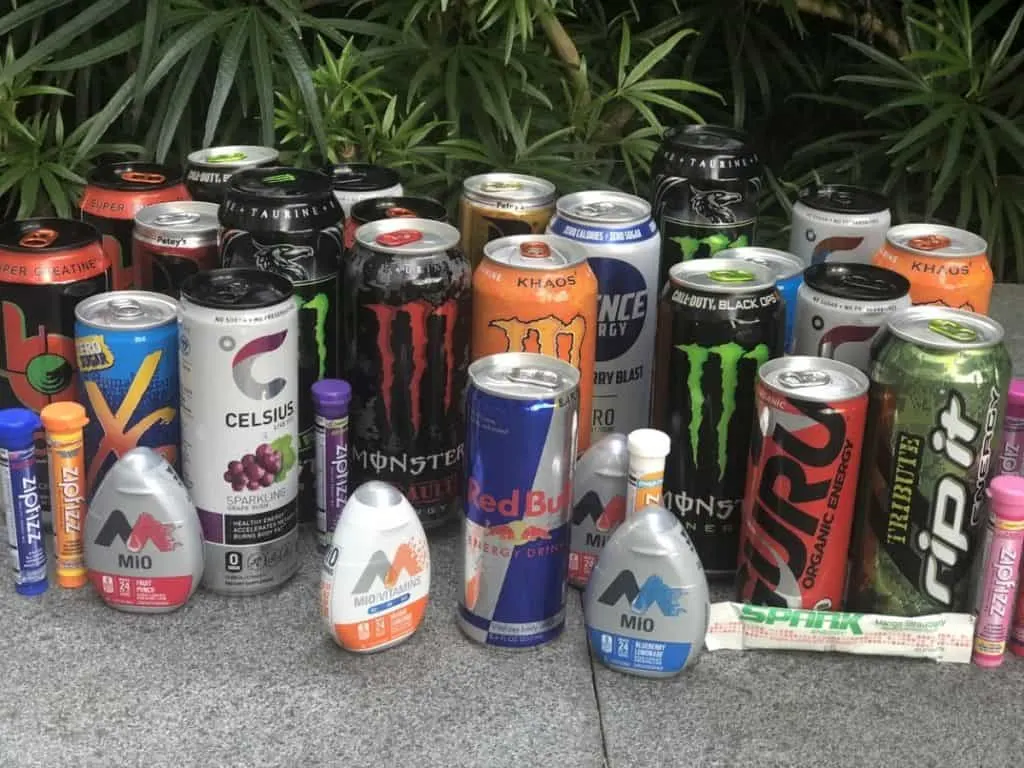
If you‘re interested in trying something new that’s similar to Red Bull energy drink, here’s a list of some alternative energy drinks that you might want to try:
- Celsius
- Bang
- Rockstar
- Monster
- NOS Energy
- Full Throttle
- Adrenaline Shot
- Uptime
- AMP Energy
- Xtend
- Reign
- 5 Hour Energy
- Guru
- Raze Energy
- C4 Energy
Final Say
All things considered, I can say that the nutrient facts of Red Bull are just in the right amount. And it should serve you well as long as you limit your intake to one can per day.
Some of the ingredients in Red Bull might be a little too much for you to have regularly. However, If you drink in moderation, you really don’t have to stress over anything.
Perhaps the slogan “Red Bull gives you wings” might just become true in your case. So enjoy your drink!
Don’t buy Red Bull before you check out my complete buying guide. It will help you get the best deal and make sure you don’t pay too much.
